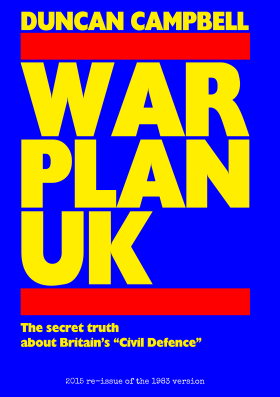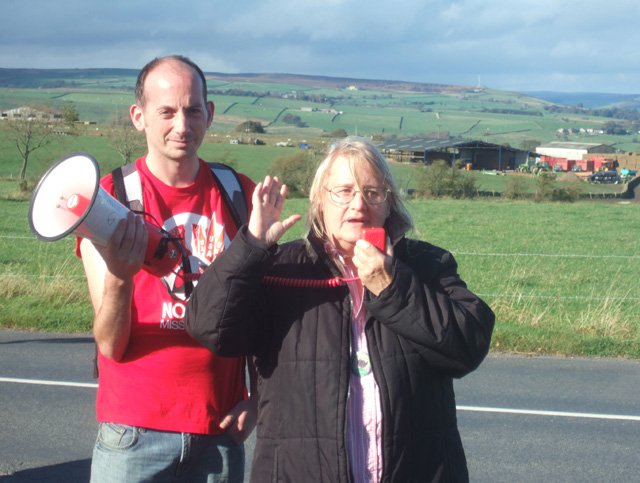War Plan UK now available again

 Duncan Campbell's book War Plan UK is now available in print again.
Duncan Campbell's book War Plan UK is now available in print again.
A copy of the Second Edition, originally published by Paladin in 1983, has been scanned and turned in to a print-on-demand A5 paperback.
This new release is not a "new edition" - aside from recreating the covers, putting an appropriate "this is a reprint" note on the title page, and making a necessary update to the Copyright page, the content is unchanged from the Paladin 1983 version.
The previous version of the book included a set of photo-pages in the middle. Those same pages of material are present in this re-release. However they will be printed as half-toned black and white images only, rather than being printed in full shades-of-grey. If this produces intolerably poor results, we will try to add electronic copies of those photographs on this page for you to download.
(At the time of writing in December 2015 we have not yet received our ordered "proof" copies from Lulu, as this page is being added to the website at the same time as the book becomes ready to order. Please check back in a month to see if we add those photos here.)
Click here to see the Re-Issue of War Plan UK by Duncan Campbell on Lulu, and order your own copy.
(The updated Back Cover can be seen here)
Another book by Duncan, The Unsinkable Aircraft Carrier, has also been made available.
For more information about both books, including answers to some probable questions, please see the Book Reprints page.
 Anne Lee from Otley, Yorkshire (image right, by Roy St Pierre), is a CND campaigner and founder of the Menwith Hill Women's Peace Camp. When we offered full reprints of War Plan UK in 2015, she told us they needed an extra introduction.
Anne Lee from Otley, Yorkshire (image right, by Roy St Pierre), is a CND campaigner and founder of the Menwith Hill Women's Peace Camp. When we offered full reprints of War Plan UK in 2015, she told us they needed an extra introduction.
"Younger people won't be aware of how seminal these discourses were" during the Cold War, she said. This is Anne's assessment:
War Plan UK was first published in 1982 at a time of heightened tension in the Cold War. It was rushed into print in advance of the imminent civil defence exercises codenamed Hard Rock.
Duncan exposes NATO's preparations to participate in a 'winnable' nuclear war between the ‘West' and the Soviet Union. The UK's agreement in 1979 to purchase Trident, and allow the USAF to station Cruise missiles at Greenham Common and Molesworth, was an escalation of the West’s 'first-strike' fire power, that threatened to tip the balance of 'mutually assured destruction' (MAD).
The information in War Plan UK is derived from primary sources. While he was employed by the Greater London Council (GLC) to uncover the truth about emergency plans to deal with the catastrophe that would follow a nuclear attack on Britain, Duncan had access to documentary information withheld from the public. His extensive research also includes investigations at the sites he identifies, including the vast defence network of secret underground bunkers (in which £ billions had been invested), from which 'World War III' would be conducted in the event of near-total devastation of Britain. For instance, as it was assumed that London would no longer exist, a huge underground complex had been developed at Corsham, connected to Regional Seats of Government (RSG).
In 1980, operation Square Leg, part of NATO's Crusader 1980 military exercises, assumed a scenario of a counterattack, in which 29 million of Britain's population had been wiped out ('megadeaths') and a further 6.5 million injured. Duncan publishes the documents granting authority for the armed forces to shoot 'Zombies' (people who had received a fatal dose of radioactivity), should they attempt to move out of contaminated areas ('Z-Zones').
Maggie Thatcher's Tory government had published reassuring propaganda to allay public fears. In an effort to suppress the rising tide of opposition, Civil Defence - and Why We Need It was issued in 1980, followed by a pamphlet, Protect and Survive, for mass public distribution. The aim was to convince ordinary people that they could survive a thermonuclear attack on Britain. They were given instructions about what measures they could take to protect themselves and their families, such as building a shelter inside their house, and were assured that afterwards life would carry on as normal. This was such codswallop, it had the reverse effect to that intended.
Following publication of War Plan UK, the GLC refused to participate in Hard Rock, because the scenario assumed the destruction of London. A number of other local authorities refused to take any part, contending that the only defence to nuclear war is abolition of the weapons. In consequence Hard Rock had to be cancelled. The non-collaborating councils declared their districts 'Nuclear Free Zones' (NFZ), although they had no powers of enforcement. The Tory-controlled media denounced the NFZ councils for acting against the public interest. Russia’s aim, they said, was to wipe us out and civil defence measures were designed to save lives. Duncan was condemned as a traitor for 'playing into the hands of the enemy'.
The government was determined to reintroduce the scratched Hard Rock exercises, so enacted legislation to force the councils to comply. The 1983 Civil Defence Regulations, granted statutory powers to compel the reluctant councils to participate. Local authorities then had no option but to comply with the law leaving only the Fire Brigades Union refusing to participate in the charade.
Also inspired by War Plan UK people began uncovering more of the secret preparations for war [see RSG website]. English Heritage as since opened some of the redundant RSGs (now deemed historic Cold War sites) to the public, however the full extent of emergency plans and organisation continues to be classified information.


